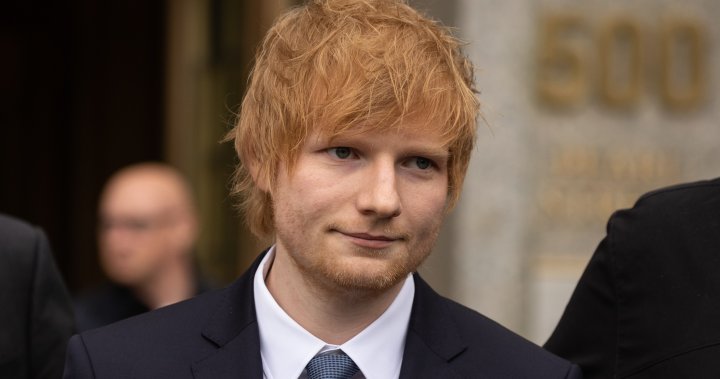Pop singer Ed Sheeran staunchly defended himself on Tuesday against allegations that his hit ballad Thinking Out Loud ripped off the melody of Marvin Gaye’s classic song Let’s Get It On.
Sheeran appeared in a New York courtroom this week as part of a lawsuit filed in 2017 by the heirs of a Let’s Get It On co-writer, Ed Townsend, who created the soulful song alongside Gaye. The lawsuit claims Sheeran, 32, and his own co-writer, Amy Wadge, knowingly plagiarized the song’s iconic four-chord sequence.
Sheeran has maintained that he created the song Thinking Out Loud himself with Wadge and did not infringe copyright. He said the romantic song was inspired by his grandparents’ love.
During the singer’s testimony, the Townsend heir’s lawyer questioned Sheeran about video of a live mashup performance in which he sang both Thinking Out Loud and Let’s Get It On in concert. Earlier in the day, civil rights lawyer Ben Crump, who is representing the Townsend estate, said the mash-up could be seen as “a confession” of plagiarism.
“We have a smoking gun,” he told the jury as they watched a recording of the performance.
Sheeran adamantly denied this and said it is “quite simple to weave in and out of songs” if they are in the same key. Both Thinking Out Loud and Let’s Get It On are in the D-major key.
“I’d be an idiot to stand on a stage in front of 20,000 people and do that,” Sheeran said of blatant plagiarism.
When he was cut off from speaking during cross-testimony, Sheeran quipped: “I feel like you don’t want me to answer because you know that what I’m going to say is actually going to make quite a lot of sense.”
More on Entertainment
Sheeran testified he regularly performs mash-ups in concert.
“Most pop songs can fit over most pop songs,” he said, comparing the Beatles’ Let It Be and Bob Marley’s No Woman, No Cry.
Crump told the jury this civil lawsuit is about “giving credit where credit is due.”
Sheeran’s lawyer, Ilene S. Farkas, said the lawsuit is unwarranted.
“The two songs share versions of a similar and unprotectable chord progression that was freely available to all songwriters,” Farkas said. “No one owns basic musical building blocks.”
Let’s Get It On has been heard in countless films and commercials and garnered hundreds of millions of streams, spins and radio plays since it came out in 1973. Thinking Out Loud won a Grammy for Song of the Year in 2016.
Townsend, who also wrote the 1958 R&B doo-wop hit For Your Love, was a singer, songwriter and lawyer. He died in 2003. His daughter, Kathryn Townsend Griffin, is leading the lawsuit.
“I think Mr. Sheeran is a great artist with a great future,” she said in her testimony, adding that she didn’t want it to get to this point. “But I have to protect my father’s legacy.”
The trial is expected to last for at least two weeks. Sheeran also faces two additional lawsuits brought on by the Townsend estate, though they are currently on hold.
In April 2022, Sheeran won a similar copyright lawsuit over his biggest hit, Shape of You. A judge ruled Sheeran had not plagiarized the work of another British performer, Sami Chokri, who accused him of stealing the melody from his 2015 song, Oh Why.
At the time, Sheeran called the lawsuit “really damaging to the songwriting industry.”
Sheeran argued there has “become a culture where a claim is made with the idea that settlement will be cheaper than taking it to court, even if there’s no base of the claim.”
“There’s only so many notes and very few chords used in pop music — coincidence is bound to happen if 60,000 songs are being released every day on Spotify,” he said. “That’s 22 million songs a year, and there’s only 12 notes that are available.”
In 2017, Sheeran settled out of court over claims that his song Photograph shared striking similarities to the Matt Cardle song Amazing. He has since said he regrets the settlement because it opened the “floodgates” for more bogus copyright claims.
— With files from The Associated Press
© 2023 Global News, a division of Corus Entertainment Inc.




